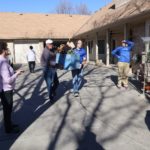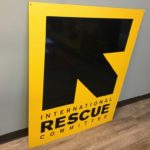In a span of months last year, a 26-year-old Afghanistan native named Wissa flew from his homeland to Qatar, then to Germany, next to Virginia and finally to Wichita.
Wissa fled the Taliban takeover of Afghanistan along with his parents and three younger brothers, who range in age down to 14. He did not choose Kansas and knew no one here, but he now knows most of his fellow Afghan refugees who were flown from a U.S. military base to Wichita.
“We are like a community,” Wissa said.
The federal government is helping resettle up to 95,000 Afghan refugees in the U.S., according to the State Department. Kansas is receiving about 650 of them, with 400 of those having arrived in Wichita by February.
It’s not only a government effort. Organizations such as area Rotary Clubs and Catholic Charities in Kansas are rolling out the welcome mat, too.
A multicounty Rotary Club drive is providing kitchenware, dinnerware, cookware and bathroom items to Afghans setting up households. Donations also include furniture, toys and appliances ranging from television screens to irons. Money generated by five Rotary Clubs in Wichita and Rotary Clubs in Andover, Derby, El Dorado, and Newton will purchase such goods as mattresses.
“They have virtually nothing at all,” said Scott Hannon, president-elect of the Rotary Club of Andover and a retired pastor. “This is a start.”
Kathy Sexton, the retired Derby city manager who coordinated the Rotary drive, said residents with connections to McConnell Air Force Base seem especially eager to help.
“Those people have been like, ‘Tell me what I can do to help.’ They were there, they know that a lot of these people coming over here now were their interpreters, their drivers, their cooks and chefs and people who really helped them out.”
History of help
Aiding refugees fleeing persecution or hunger is part of the history of area organizations and congregations. Newton’s First Mennonite Church, founded in 1878, began helping refugees coming from Europe in the 1800s. More refugees came in the 1920s and ‘30s. In the 1970s and ‘80s, Catholic and Lutheran churches in Wichita sponsored hundreds of refugees from Vietnam and other southeast Asia countries. Southeast Asians now comprise about 2.4 percent of the city’s population, five times the national average. Smaller numbers of refugees from the Sudan, Congo, Central America and many other parts of the world have been welcomed here as well.
Today, the State Department has designated nine resettlement agencies across the country. Two agencies on that list — the International Rescue Committee and the United States Conference of Catholic Bishops — are providing a portal for Afghans resettling in Kansas.
Wichita is one of 26 U.S. cities with an International Rescue Committee office. Founded in 1933 at the behest of Albert Einstein, the IRC is a nongovernmental organization that has helped refugees flee Nazi Germany, Communist regimes in Eastern Europe, Cuba and Asia, plus many other parts of the world suffering wars and other emergencies. Its Wichita office opened in 2011. Most other IRC offices are located in bigger cities on the coasts.
The IRC office was expected to help up to 550 refugees from various countries during the fiscal year that started Oct. 1, 2021. Because of the influx of Afghan refugees, the number of refugees coming from other countries is expected to be less than originally envisioned. Still, the overall number of refugees resettled here by the IRC will set a record this year. The rising volume is one reason the IRC moved in early 2022 from space near Harry and Oliver to larger quarters at 420 S. Emporia. The new location also provides ground-floor storage for donated items.
Catholic Charities of Northeast Kansas had helped settled 204 Afghan refugees by early February, and Catholic Charities of Southwest Kansas was expected to reach its capacity of 46 refugees in February. IRC and Catholic Charities help refugees find jobs and educational opportunities as well as housing and other basic needs.
The Islamic Society of Wichita has helped new arrivals acclimate to the city.
Eileen Farhat, refugee director of the Islamic Society of Wichita, said most of the refugees are “younger,” with the oldest she knew of being in their mid 40s.
“Lots of kids,” Farhat said, mentioning one couple with 13 children.
“When they move to the permanent places, we try to give them prayer books, Korans,” Farhat said. “Most can read the Arabic, they can read the Koran.”
“They really like to come to our Friday prayer.”
‘Accept the challenges’
Wissa and his family, like many other Afghans, left their country in the summer of 2021 with not much more than the clothes they wore.
He has obtained a Social Security number and driver’s license, although he considers highways here — and the speedy traffic — a challenge. His English language skills improve daily. His family had the keys to a rental house in February but was staying in a hotel until some work to it could be completed.
Wissa worked in a bank in Afghanistan but is flexible about what kind of job he might get in Kansas. “You should accept the challenges and do your best,” he said. As for Kansas, he said he loves it.
The Afghan refugees are a mix. Some aided the U.S. military mission, working as interpreters, drivers and cooks. Other refugees are women who were active in women’s rights organizations or in education. All felt their lives or freedom could be in peril under Taliban rule.
The new arrivals are concerned for family members in Afghanistan. Wissa did not provide his last name out of consideration for the safety of those in Afghanistan.
There isn’t a petition process in place for refugees to get relatives out. They themselves are not guaranteed citizenship here.
When the Wichita City Council approved an amendment last October to help Afghans obtain housing voucher assistance, Mayor Brandon Whipple observed that the refugees were “not only homeless but also nationless.”
Many Afghans have only temporary status in the U.S. They must apply for asylum or some other status to remain.
In Wichita, the IRC will hire legal assistance to help the Afghan refugees with their status. The IRC has put out a call for additional donations and volunteers to drive refugees to appointments, teach them English and more.
Morgan Palace, refugee manager at the Wichita IRC office, said it’s difficult to overstate how much help refugees need.
“Stand in your living room. Do a 360. Floor to ceiling, that’s what (they) need” — along with items from every other room in a house.
Sexton said the Rotary drive, which was coordinated with the IRC, helped some members who faced the challenge of downsizing at home.
“As you go out and explain this, you just see the eyes light up. ‘Oh, I have extra pots and pans in the back of the cabinet,’” Sexton said.
Rotary Club focuses on international as well as local projects, she said, “and this just seemed to have a flavor of both.”
Contact Mary Clarkin at mary.e.clarkin@gmail.com.
Donations of housewares and more sought
The Rotary donation drive is over, but the Wichita office of the International Rescue Committee is still seeking donations to provide refugees with dishes, furniture, appliances and basic housewares. IRC also helps them find homes, jobs, English classes and more.
Beginning March 1, donations can be brought to the IRC’s new warehouse at 420 S. Emporia, Suite 220, from 9 a.m.-5 p.m. Monday-Friday. The IRC is also looking for volunteers to help the refugees. For more information or to volunteer, call 316-351-5495.
Dinnerware kit — 8 place settings of dinner plates, salad plates, bowls, drinking glasses, mugs/tea cups and silverware.
Kitchen kit — 3 mixing bowls, 3 or more kitchen knives, 3 cutting boards, 3 plastic or glass storage containers, a can opener, dish drying rack, wooden or metal cooking utensils, 2 oven mitts, 2 towels.
Cookware kit — 3 or more pots and pans, a stockpot, bakeware and tea kettle.
Bathroom kit — Shower curtain, curtain rod and shower hooks, toilet brush and plunger, toothbrush holder and wastebasket.
Additionally, donations of the following items are requested for refugees (an asterisk denotes that the item must be new). They are part of the apartment set-up used to welcome arrivals.
Toys
Soccer balls
Puzzles
Picture books
Dolls (black & brown dolls preferred)
Stuffed animals
Cars
Coloring books
Crayons*
Play-Doh*
Blocks
Art supplies*
Furniture
Bed frames in twin,full, queen
Mattresses*
Dining table & chairs
Sofa
Dresser
Coffee table
End table
Bathroom Items
Toilet paper*
Shampoo*
Bar soap*
Hand soap*
Toothbrush*
Toothpaste*
Deodorant*
First aid supplies*
Lotion*
Feminine hygiene pads*
Razors & shaving cream*
Diapers & wipes*
Digital thermometer*
Cleaning Supplies
Dish soap*
All purpose cleaner*
Sponges, cleaning rags, paper towels*
Laundry detergent*
Kitchen trashcan
Bathroom wastebasket
Mop*
Broom & dustpan*
Trashbags*
Cleaning bucket
Linens & Towels
Bath towels*
Hand towels*
Wash cloths*
Laundry basket
Sheet sets — twin, full, queen
Throw blankets
Pillows*
Household Items
Alarm clock & batteries
Notebooks, pens, pencils
Adult backpacks/purses
Wallets
Watches
Lamp & lightbulbs
Plastic three drawer storage bin
Clothes hangers
Area rug
Iron & ironing board
Umbrella
Fire extinguisher*
Calendar (current year)
Quarters for laundry
Car seats*
Home decor items
Electronics
Smart TVs (or a Roku)
Microwave
Vacuum cleaner
Electric fan













